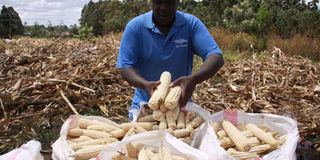More ideas, efforts needed to battle climate change effects in Africa

Abraham Arusei loads maize combs into sacks for transportation at his farm in Uasin Gishu on November 21, 2016. In Africa, 70 per cent of the population is dependent on rain-fed, smallholder agriculture. PHOTO | JARED NYATAYA | NATION MEDIA GROUP
What you need to know:
- As is the case with many countries in southern Africa, Malawi has experienced widespread crop failures due to a devastatingly strong El Niño.
Experts use many numbers when talking about climate change.
However, rising temperatures, the resulting crop failure, and the consequent loss of livelihoods and destitution of millions of households are this year’s most important and urgent developments for millions of smallholder farmers across Africa.
To illustrate the unfolding crisis, let us consider the case of Malawi, one of the few countries to have achieved a fair deal of agricultural success but is now facing the worst drought in over three decades.
As is the case with many countries in southern Africa, Malawi has experienced widespread crop failures due to a devastatingly strong El Niño.
The country witnessed late on-set of rains, erratic rainfall, floods and prolonged dry spells.
As a result, the production of maize — the country’s main staple crop — is estimated at just over 2.5 million tonnes in 2016.
This is 16 per cent lower than the reduced harvest in 2015 and 34 per cent below the previous five-year average and has left 39 per cent of the population dependant on national and international food aid to survive — a 129 per cent increase.
In the hardest hit areas, farmers simply couldn’t plant as the rains never came.
Dealing with this challenge in the future will require both efforts to reduce climate change and, most importantly, strategies to enable farmers to adapt to its effects.
Last month, world’s climate change experts and policy makers met in Marrakesh, Morocco, to try to set the world on track to reducing greenhouse gas emissions that cause climate change.
Last year, the same experts met in Paris and reached a welcome agreement that seeks to limit the rise in global temperatures above pre-industrial levels by two degrees Celsius.
However, the emissions of greenhouse gases are not falling yet and the effects of climate change are worsening.
Much more still needs to be done to address this challenge proactively.
Nowhere else is the imperative to act more urgent than in Africa, where 70 per cent of the population is dependent on rain-fed, smallholder agriculture.
Dr Kalibata is the President, Alliance for a Green Revolution in Africa (AGRA)




